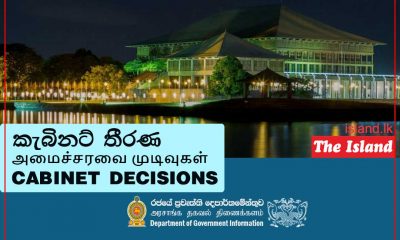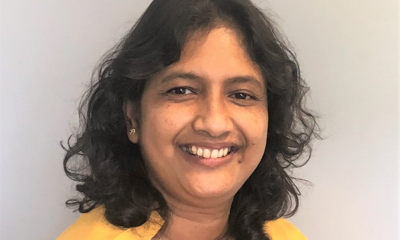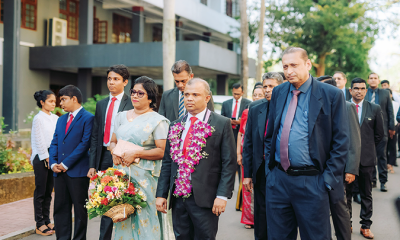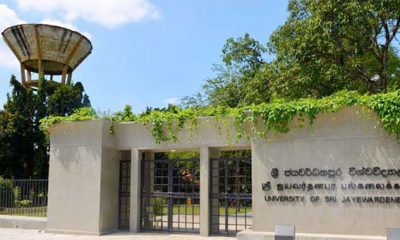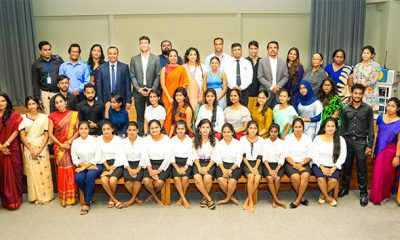Opinion
Rendezvous with Patrick and Diplomacy
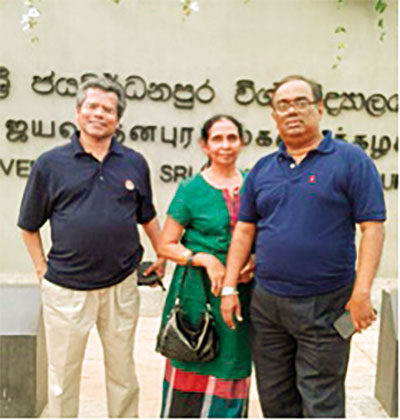
Illustrious Alumnus of Sri J’pura Wins the Lifetime Achievement Award in the United States
by Dr. Sunil Nawaratne
The Sri Lanka Foundation in California has selected Prof. Patrick Mendis for its prestigious Lifetime Achievement Award among Sri Lankan professionals living overseas. He is among the youngest to receive this honour for his distinguished academic career, award-winning diplomatic service, and philanthropic activities in the United States and Sri Lanka.
Prof. Patrick Mendis is widely known to thousands of alumni and educators for his eponymous annual financial prize at the University of Sri Jayewardenepura. In the United States, he has also established scholarships for students at the University of Minnesota and Harvard—two of his other alma maters.
Patrick and I are alumni of the University of Sri Jayewardenepura. Over the years, we have stayed connected, crossed our paths during my postgraduate studies in Japan, and often got together with our friends and alumni whenever he visited his family in Sri Lanka.
In the late 1970s, Patrick won a highly selective American Field Service (AFS) scholarship to study at Perham High School in Minnesota. Upon graduating with a U.S. diploma, Patrick returned to attend the University of Sri Jayewardenepura where we first met in the early 1980s.
He earned the coveted First Class Honours degree in Bachelor of Science from the Faculty of Management Studies and Commerce. As he completed his secondary education in the United States, Patrick often sought counsel and guidance from his Canadian and American Fulbright professors who visited our university. These visiting professors offered him scholarships for postgraduate studies in Canada and the United States. But Patrick returned to his AFS family in Minnesota, which he proudly considers his “birthplace” in America.
Minnesota is one of the coldest and snowiest among the 50 states; the tropical Sri Lanka by comparison is one-third the size of this beautiful “Land of 10,000 Lakes.” Patrick evidently fell in love with “Minnesota Nice,” as he described the generosity of its industrious and gentle people.
Patrick progressed to work at the Minnesota House of Representatives. He later received the Hubert Humphrey fellowship and the Notre Dame scholarship to complete his master’s and doctoral degrees at the Hubert H. Humphrey School of Public Affairs and the University of Minnesota.
While teaching at the University of Minnesota in the early 1990s, Patrick endowed two annual scholarships at Sri J’pura. These scholarships were later combined into the Dr. Patrick Mendis Prize to reflect his own outstanding achievements in management studies, leadership accomplishments in sports, and numerous contributions to the World University Service as its president in Sri Lanka. Patrick would explain that the annual prize is a fulfilling way to give back and to inspire the next generation of leaders and managers to do things better than he did.
In the subsequent years, I focused on my career in the fields of business management, government service, and higher education in Sri Lanka while Patrick ventured into international diplomacy, teaching, and conducting research at Harvard, Oxford, Yale, and other universities. At Harvard, he finished his mid-career Executive Leadership Programme at the John F. Kennedy School of Government. As a visiting faculty member, he later returned to serve as a Rajawali senior fellow at the Harvard Kennedy School and a research associate of the Fairbank Center for Chinese Studies at Harvard.
More importantly, however, Patrick blended his academic pursuits with public service in the United States government, the World Bank, and the United Nations.
While studying in Minnesota, the government of Sri Lanka appointed Patrick to the United Nations as its first Youth Ambassador to represent Sri Lanka at the First UN International Year of the Youth (IYY) in New York. Ambassador Karunasena Kodituwakku, then the Vice Chancellor of the University of Sri Jayewardenepura, recommended Patrick to President Ranil Wickremesinghe, then the Minister of Education. For his leadership at the United Nations, the UN Secretary General honored him with the UN Medal for the IYY.
Patrick began his American government service in the United States Senate Foreign Relations Committee during the Ronald Reagan administration. Congressman Gerry Connolly, a former Senate colleague and now his congressional representative from Virginia, writes: “Dr. Patrick Mendis is a highly respected foreign policy scholar, an award-winning public servant, and American diplomat. Patrick and I served in the Senate Foreign Relations Committee.”
After government service, he returned to academia. Patrick then served as a distinguished senior fellow and affiliate professor of public and international affairs at the Schar School of Policy and Government at the George Mason University in Virginia. While serving as the Vice President of the Osgood Centre for International Studies and a visiting foreign policy scholar at the Paul H. Nitze School of Advanced International Studies at the Johns Hopkins University in Maryland, he authored books, published articles, and lectured on UN affairs.
At the U.S. Department of State, he was assigned to serve as the chairman of the interagency policy group on science and technology in the Bill Clinton administration. Under the George Bush administration, the late Secretary of State Colin Powell appointed him to the Bureau of Educational and Cultural Affairs as its secretariat director to manage the Fulbright, Humphrey, and other international exchange programmes. Patrick also served as an advisor to the United States Delegations to the United Nations.
During the Barack Obama administration, Patrick was appointed as a Commissioner to the U.S. National Commission for UNESCO at the Department of State. His tenure ended when the Donald Trump administration withdrew from the UN.
United States Senator Chris Van Hollen, who grew up in Sri Lanka but now represents Maryland, describes his friend: “Patrick has contributed years of dedicated service to our country, and has been recognised for his academic achievements, outstanding government career, and important philanthropic work.”
During his service at the Department of State, Patrick also taught MBA courses at the University of Maryland. Through the University of Maryland Global Campus, Patrick previously worked as a military professor in the NATO and the Indo-Pacific Commands of the Pentagon with a range of teaching tours in England, Germany, Italy, Japan, Spain, South Korea, and Turkey.
After returning to Washington, D.C., Patrick has also worked in various federal agencies in the United States government.
Senator Amy Klobuchar from Minnesota, a former presidential candidate, explains her fellow Minnesotan this way: “Dr. Mendis is a respected leader and award-winning public servant, teacher, and diplomat” who has served in “the U.S. Departments of Agriculture, Energy, Defense, and State.”
Over the years, the University of Minnesota has recognised Patrick with the Alumnus of Notable Achievement (ANA) Award, the Harold Stassen Award for UN Affairs, and the Hubert Humphrey Leadership Award. The Minnesota Magazine described the illustrious American as “a scholar and a diplomat” for his leadership in government service. Patrick was honored with the Benjamin Franklin Award by the U.S. Department of States and the USDA Graduate School
Award for Leadership and Service by the U.S. Department of Agriculture.
Patrick has worked in—and travelled to—more than 130 countries. His lifetime achievements are yet to come. Patrick is currently serving as a distinguished visiting professor of transatlantic relations at the University of Warsaw in Poland as well as a distinguished visiting professor of global affairs at the National Chengchi University in Taiwan. He is a fellow of the World Academy of Art and Science.
Patrick has also lectured at the Sir John Kotelawala Defence University and other Sri Lankan universities in Colombo, Jaffna, Kelaniya, and Sri Jayewardenepura.
As highlighted in this narrative, it is truly a distinct honour to have such an eminent alumnus as a steadfast friend in the United States. His American journey from Sri Lanka has indeed shown us the value of education and the power of diplomacy beyond national boundaries for a better world for all of us.
*Dr. Sunil Nawaratne, an alumnus of the University of Sri Jayewardenepura, is the Director-General of the National Institute of Education and a former permanent secretary to the Ministry of Higher Education in Sri Lanka.
Opinion
Mrs Hemamali Kanthi Jayasinghe
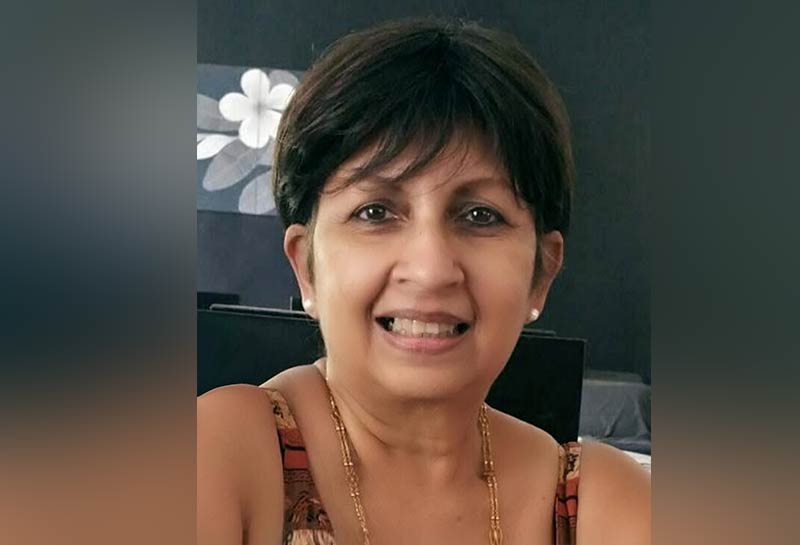
Mrs. Hemamali Kanthi Jayasinghe known by all her friends and relations lovingly as ‘Bunchi’, left us on August 20, 2024, leaving an unfillable void for her husband Lal, daughter Chanika and grandchildren Isurika and Pavith. I know from Bunchi’s narratives related to me of their success stories in Australia. her grand- children Isurika and Pavith had a special place in her heart. This is natural, and as should be.
Bunchi was a rare individual who left a void in all groups whom she came across in life- both among her friends and relations. It was especially true for her sister-in-law and family, her aunts, cousins and their spouses. Bunchi and Lal were a couple who never abandoned their cousins in good times or bad. The two of them were all-weather relations. She had an open house for her friends and relations, and a sympathetic heart that inwardly motivated her to be helpful to others.
We live in Kelaniya. Over the last so many years, whenever there was a public warning about floods in Kelaniya, like a prayer, a call would come from Bunchi- ‘Aiya if there is any threat of floods, both of you, please come and stay with us’; usually this invitation is also repeated by Lal. About four months ago, when a flood warning was issued to all major river basins, Bunchi even though sick, gave us a call followed by Lal, and invited us to come over to Kadawatha. Although she was ill and weak, she did not forget to offer help to others.
Lal was the family doctor for all families of Bunchi’s cousins and aunts. When a call came for help, if it was found to be medically necessary to visit, Bunchi always accompanied Lal to their relations’ homes. Lal looked into the medical side, while Bunchi’s concern and ‘recuperative words’ provided psychological help to the sick. So, in most instances it was the doctor accompanied by his wife, who came to the patient instead of the patient going to the doctor. The service was totally free.
I still vividly remember this day in, I guess 1984, I was getting ready to go to USA on official duty. Our elder daughter complained of a severe stomach ache. I phoned Lal who examined her and said that there was some tenderness, but asked me to go as planned and that even if surgery was needed, he would arrange everything including showing our daughter to a surgeon and following up. Bunchi told me ‘we will look after everything – you just go’. This was one instance of help that Bunchi and Lal did for us. It was a great responsibility that they decided to shoulder to help a cousin. And I know that some other cousins or relations of Bunchi can also relate such magnanimous instances of offering help.
Bunchi and Lal were well known among friends and relations for giving dinners at their Kadawatha home. Their home was well- equipped for such occasions. Her mother Irene who was also living at Bunchi’s (Irene ‘nanda’ to us) also helped in bringing out culinary delights.
I am bringing the above entertainment story in order to highlight another deep- seated side to Bunchi and Lal that was perhaps only known to their close relations and cousins. At the ‘Mathaka Vastra pinkama’ this was well articulated by the two Nayaka Theros who conducted the religious ceremony at her funeral. Bunchi and Lal were both religious and Bunchi helped Lal to continue with all the traditional ‘Pinkamas’ that Lal’s parents had been conducting for so many years. Bunchi also started new ‘Pinkamas’. And in these merit acquiring activities they involved their daughter and grandchildren and nephew and niece from their young days to inculcate in them the importance of spiritual reinforcement in addition to practicing their vocations.
It was heartening to note that Chanika and Lal (despite being handicapped without Bunchi’s support) continued to participate in the’ Katina pinkama’ of the Bimbaramaya Temple, Kadawatha, by preparing some items for the ‘dana’ at the ‘Katina Pinkama’. I believe there were about 70 bhikkhus at the alms-giving.
When they were at home, Bunchi and Lal would do the morning and evening ‘Buddha Puja’ and other worship without a break. Lal now continues with the tradition by himself.
However, they were also open to the modern world and its necessities and responsibilities. They were a very cosmopolitan couple; they had close friends belonging to all religious denominations, both in Sri Lanka and abroad. They kept in close contact with them. What they accomplished over a substantial period of time through their diverse relationships and hospitality, was an important sociological need for Sri Lanka- that is to go forward in unity while being diverse. Lal also worked for many years for NHS in UK, and both of them were happy to receive friends and relations from Sri Lanka at their Lincoln home. They decided to return home to be with their aging parents.
Another positive aspect of Lal and Bunchi was the sincere, helpful, and long-standing- relationship they had with their domestic aides. The domestic-aides in turn were strongly loyal to Bunchi and Lal.
Throughout Bunchi’s some-what long illness, Lal and Chanika looked after Bunchi with love and tenderness.
Hemamali Kanthi Jayasinghe was the daughter of the late Dr. Gilbert Gajanayaka and the late Mrs. Irene Munasinghe Gajanyaka. She was the sister of the late Mr. Gamini Gajanayaka.
May Bunchi attain the Supreme Bliss of Nibbana.
Lakshman Wickramasinghe
Opinion
Significance of Tamil vote in 2024 general election
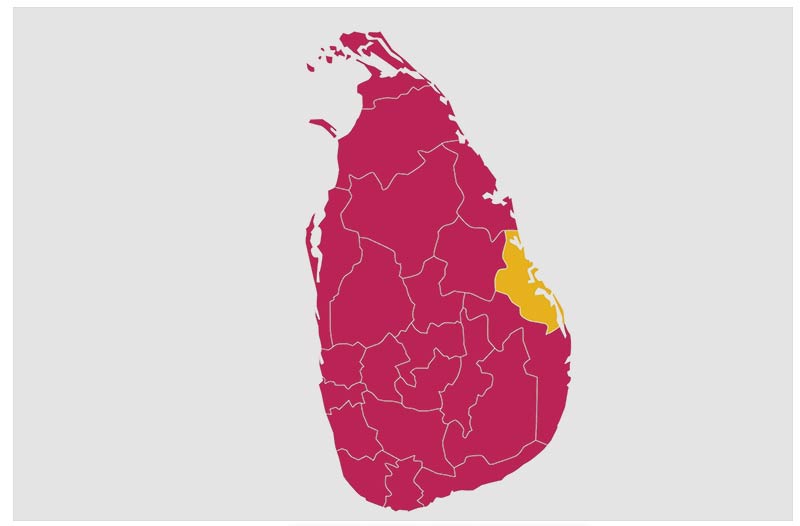
Apart from the resounding victory by the NPP, the most significant election outcome is the remarkable change in the voting pattern of the Tamils in the North, the East, and the Central province not to mention Colombo that brought defeat to most of the Tamil political stalwarts like Sithatharan, Sumanthiran, Palani Thigambaram, Mano Ganeshan et al. This is the first time that such a change has happened in a general election where usually the ethnic political parties hold sway over minority votes. It is of vital importance for everybody including Tamil politicians, the present government, international community, hegemonic powers, ultra-nationalists and separatists to understand and correctly interpret this change in the Tamil political fabric.
The decisive factor that was apparent in the pre-election period was the need for a change which manifested in a weaker form at the presidential election that brought in a new president with 42% of the national vote with the majority of Tamils voting against the NPP candidate. In less than two months the whole picture had changed and a majority of Tamils who did not vote for the NPP at the presidential election took the unprecedented step of going against their own ethnic parties and voted for the NPP. Although it appears to be a sudden change of attitude obviously such changes on such a wide scale cannot happen overnight. The need for a system change must have been slowly and steadily growing in the minds of Tamils over a period of time, like it had in the Sinhalese. The latter was obviously weary of suffering under the governments of the two major political parties since independence. The former however had hitherto been loyal to their ethnic parties who pursued divisive communal politics appealing to the ultra-nationalist sentiments of the Tamils. What was the reason for the Tamils to change in this manner?
Presidential election may have shown the Tamils that the Sinhalese had decided to bring about a radical change. This would have been the cue for them to come out into the open and demonstrate the change that has been slowly taking place in their minds. The change that appeared to have taken place in less than two months was probably catalyzed in this manner.
Tamils suffered during the thirty-year war. It is probable that the new generation of Tamils have realised the futility of war and confrontation and decided to chart a different course and deviate from the main sociopolitical stream from the time of independence though there were times of convergence and cooperation albeit of short duration. Independence and universal franchise have driven a wedge between Sinhala and Tamil leaders which was rather unfortunate for they were together in the struggle for Independence. Tamil politicians enjoyed parity of political power and suddenly they realized that their privileged position was in danger due to universal franchise which would make them a minority in the parliament. They could not reconcile with the fact that they were representatives of a minority community. What is most unfortunate is that they could not see the opportunities that were there for them to play a vital role in the development of the whole country. The mistake the Tamil leaders committed at that time was to abandon the opportunity that was available to jointly participate in the central government and contribute to the development of not only the Tamils but also the whole country and instead choose the narrow parochial path of communal politics. This blunder has continued to plague the country and even caused the birth of terrorism and a bloody war.
These historical mistakes must have dawned on the new generation of Tamils who, like the Sinhalese want a change in their lives which could come with economic development rather than ultra-nationalist dogma. Further they may have realized the fact that Tamil ultra-nationalism was flawed, unjust, parochial and does not belong in the modern world. Communal barriers have to be breached to achieve connectivity, interaction and networking which are capable of opening new vistas in the modern electronic era. All communities who have made Sri Lanka their home must unite and develop their country. The absence of this unity may have been one of the reasons for the country to lag behind in economic development and finally end up being bankrupt which would have affected all communities alike. In this regard the Tamils have taken the first step and it is now up to the other communities to suitably respond.
The government must know that the Tamils have significantly contributed to their massive victory. The government must understand what these Tamils who have rejected their own political parties and leaders want. They, too, like the Sinhalese are affected by economic mismanagement and poverty. Their problems are same as those of the Sinhalese majority. All communities are in the same boat. Tamils have realised this truth and would want urgent attention to their immediate needs. Their nutrition, health and education should receive immediate and sufficient attention. Tamils have abandoned their own parties and embraced the governing party expecting urgent redress to their burning problems.
There is a lesson for the international community as well, especially for the imperialist western powers. The latter had made use of the lack of unity among the communities to destabilise the country in pursuance of their geo-political ambitions in the Indian Ocean region. The LTTE was a tool in their hands, and after the demise of its leader, other separatists moved in to fill the vacuum. The western powers must realise the futility of such policies in view of the radical changes taking place within the mind-set of the Tamils. Tamils may no longer see the Sinhalese as their oppressors and the Sinhalese may not harbour the fear that Tamils are demanding a separate country.
It is hoped that the time may come when the Tamils realise that the whole country belongs to all communities and it is their duty to participate in the development of the whole and not just the North and parts of the East. True Tamil national leaders may emerge who would want to share power at the centre rather than at the periphery and contribute to the governing of the whole country. It is hoped that this is the end of divisive communal politics and the beginning of a new era of unity and prosperity.
N. A. de S. Amaratunga
Opinion
Revolutionary elections

By Dr Upul Wijayawardhana
No doubt, it is the ‘election like no other’ in the ‘country like no other’ that would top the league of revolutionary elections, of which there were three, just this month. Much has been written about two; the one in Sri Lanka and the second in the US but the third, in the UK, had hardly any mention in Sri Lankan media, perhaps, because it was not a general election but the election of the leader of a major political party, which I would come to later.
The NPP/JVP deserves to be congratulated on its unprecedented, massive victory and it is hoped that the new government will succeed. All ‘communal’ parties, save a few, faced humiliating defeats. The NPP won 21 out of 22 districts, the only exception being Batticaloa. Its win in Jaffna sends a clear message to the communal parties, whose leaders have been taking the people of the North for a ride to further their own interests. Do hope the new government makes good use of this golden opportunity to bring about reconciliation.
It is not only the results in the North that gives hope but also from the South. It was gratifying for me to note that my home district Matara, which is predominantly Sinhala, has elected a Tamil MP as well as a Muslim MP. Not only that, out of the 6 NPP MPs elected, the Tamil MP got the second highest and the Muslim MP got the fourth highest preferential votes. A district once well known to elect on the basis of caste and creed, a concept encouraged if not engineered by the Communist Party, has gone a full circle, thanks to another Marxist party! Perhaps, this demonstrates that voters are no longer misled by man-made differences and are achieving a degree of political maturity, which bodes well for the future. Yet another ray of hope for true reconciliation!
As far as the US election is concerned, even the bitterest critic of Donald Trump has to concede that he achieved the impossible, not once but twice. On both occasions, it was not that Trump was selected by the Republican Party but he got the party to rally round him. In fact, Trump started life as a Democrat and was not a professional politician. He achieved fame as a sharp businessman and a TV personality and decided to be president. One man’s ambition succeeding is unprecedented in US history, as far as I am aware. Though Trump won the 2016 election on the collegiate vote, he was almost 300,000 behind Hilary Clinton in the popular vote. In the 2020 election which he lost to Biden, he polled 74,223,975 whereas Biden polled 81,283,501. In the 2024 election though his popular vote increased to only 76,768,490 votes (according to the last count, as counting in US elections is very prolonged), he had a landslide winning 312 collegiate votes. Kamala Harris polled only 74,194,538, staggering 7 million less than Biden. Do these results give credence to Trump’s accusations of vote rigging in the 2020 election, I do not know. When he was portrayed as a bitter loser, no one ever imagined that Trump would have a comeback. Multitude of court cases he faced made the prospect even dimmer. His dramatic win, perhaps, adds weight to his claim that some of these cases were politically motivated.
The other important aspect of the US presidential election is that all polling organisations got their predictions totally wrong. Up to the last moment, it was too close to call they said, but as the counts proceeded, it was obvious that Trump has achieved the impossible again. However, the most important lesson for the rest of the world is that the US voting system is nothing worth emulating!
Whilst the USA is still waiting for the ‘glass ceiling’ to be broken, the UK has had three female prime ministers and recently elected another lady as the leader of a major political party. Interestingly, it is the Conservative party that seems to be progressive, the Labour Party still waiting to elect a female leader, in spite of two having acted as leader!
Kemi Badenoch, who was elected as the leader by the members of the Conservative Party early this month, is the Leader of the Opposition and may well be next Prime Minister, if the Labour government continues to mess up, as it is doing now. She may well follow Margaret Thatcher, Theresa May and, of course, the disastrous Liz Truss.
Kemi Badenoch’s election is revolutionary in two more aspects. She is the first Black leader. male or female, of a major UK political party. Further, she is the first immigrant to be a leader of a major political party. Though the US constitution stipulates that only a person born in the US could hold the highest political position there is no such stipulation in the UK. If that was so, Boris Johnson would not have been PM, as he was born to British parents in New York, while his father was studying in Columbia University!
Kemi Badenoch’s family is from Nigeria, her father being a GP and her mother a professor of physiology. Theoretically, though she spent the first sixteen years of her life in Nigeria and USA where her mother lectured, she could be classed non-immigrant as her mother travelled to London from Lagos to have her in a private hospital in Wimbledon, to return shortly after the delivery of the baby. In fact, in her first speech in parliament Badenoch declared that “to all intents and purposes, I am a first-generation immigrant”. Whatever it may be, hats-off to the UK for achieving this degree of political maturity, which is hoped we would be able to emulate ultimately.
What a revolution would it be, if a Black immigrant lady became the Prime Minister of the UK!
-
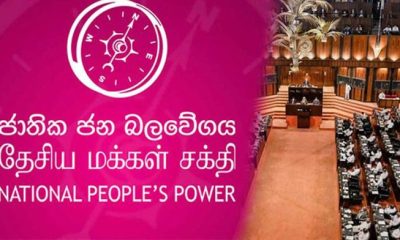
 News6 days ago
News6 days agoNPP appoints two defeated candidates as NL MPs
-
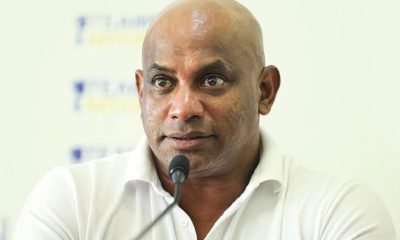
 Sports2 days ago
Sports2 days agoPathum will become world’s best batter, says Jayasuriya
-
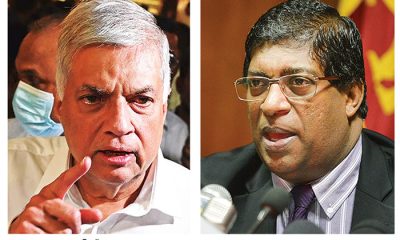
 News5 days ago
News5 days ago‘Gas Cylinder’ explodes; Ranil flays NDF Secy. for submitting Ravi’s name
-

 Midweek Review4 days ago
Midweek Review4 days ago‘Ramayanizing’ Sri Lanka by Courtesy of SriLankan Airlines
-
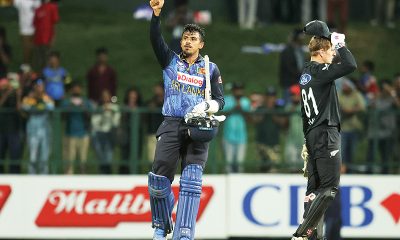
 Sports5 days ago
Sports5 days agoMaking batting compulsory for bowlers has worked – Theekshana
-

 Sports3 days ago
Sports3 days agoSri Lanka’s cricket revival continues
-
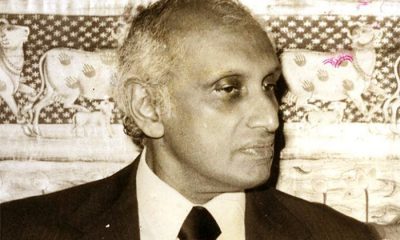
 Features4 days ago
Features4 days agoShould we go back to build another Southern Order?
-
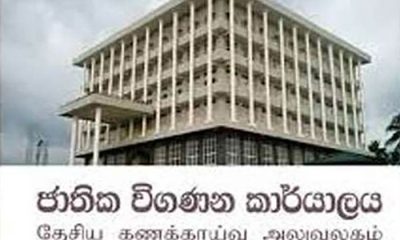
 News1 day ago
News1 day agoAbout 1,000 permits issued to SL migrant workers for electric vehicle imports misused


